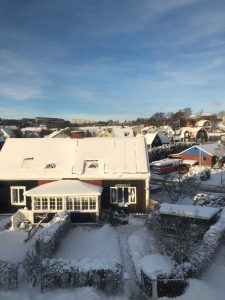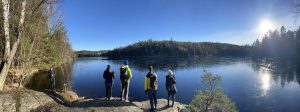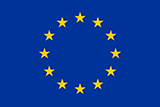It was a typical day, and everyone was working from home or enjoying so-called holidays at home due to the COVID-19 pandemic. Universities were closed, and I was trying to finish my masters’ project from home (How? It was based on 90% simulations and the remaining 10% in-vitro studies). Moreover, I was optimistic about a Ph.D. position abroad. However, when I saw open positions for COLOTAN, I was not aware of the words “ESR, Horizon 2020, MSCA”. However, I found the project quite interesting. Thus, I started preparing for application, and my journey towards COLOTAN began.
The application process was relatively easy. I decided to apply by the last week of the deadline. After a couple of interviews and discussions, I got selected as ESR10. It was a tremendously happy day for me. Nevertheless, that did not last long when I realized the tedious and stressful relocation process to Sweden, especially for the non-EU citizens (Sorry! But it is true.). Days and months passed; numerous documents were signed; visa/residence permit application was submitted. Meanwhile, we (ESRs) have attended our kick-off event along with the first COLOTAN symposium virtually. It is a great experience to be part of a team of skilled and motivated researchers.
A couple of months later, I received my residence permit and UT card. The relocation date was finalized. I was excited because I would be meeting my supervisor and the whole support team in person. My last days in India started flying quickly. Finally, I moved to Gothenburg, a wonderful and joyful city, on 2nd December 2021.

Day 1 view from my apartment, Gothenburg (Sweden)
It was a dreadful snowy day at Gothenburg. It felt significant when the surroundings changed from 30°C to -10 °C in one day. It was a challenge for me to strive through a dark, snowy winter in Sweden, but I have got used to the weather now, and I feel privileged to work with researchers of more than 50 nationalities at my host institution. My ESR10 project is mainly based on the in silico tools such as Gastroplus and GI-Sim. Moreover, it involves the bridging role between biopharmaceutics and computational modeling.
Finally, after three months in Sweden, I have completed several hikes, including an 18 km fast-paced one. I made new friends and enjoyed Christmas and New Year. I wandered around the city and visited most of the tourist places and attractions. Importantly, I started learning Swedish. I have improved my cooking, and many more are on the list!

Picture during a hike near Vättlefjälls naturreservat
Now, the town feels charming to me. I am learning many things from the people around me and hope the next 3.5 years of my Ph.D. will be fun.
-Harshad


